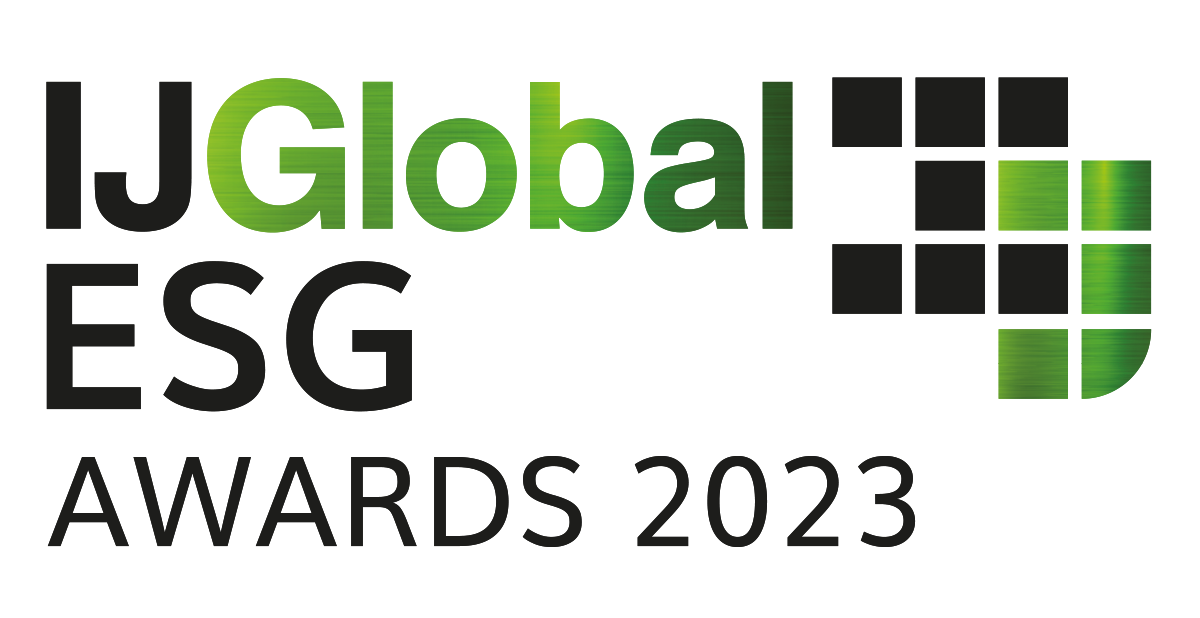IJGlobal ESG Infra Asset Manager – Debt – EDRAM
Edmond de Rothschild Asset Management (EDRAM) wins the IJGlobal ESG Infrastructure Asset Manager Award in the debt category for – as one judge puts it – going “above and beyond” and that the “environmental and social impacts of their investment approach reflects this”.
Another judge says: “They have demonstrated a strong commitment to ESG and sustainability, including innovative strategies and early compliance with SFDR regulations.”
Meanwhile another admires the structure put in place to achieve ESG goals: “They have a specific ESG sub-working group which is important to make procedural changes.”

As to SFDR Article 8, one judge thought it “unusual” that PwC conducted the audit, but added that this element was “difficult to achieve for an infrastructure debt fund”. Meanwhile another judge added: “The Article 8 ‘plus’ strategy with a minimum allocation to sustainable investments sounds conservative and appropriate for a debt fund.”
The final judge comment states: “This entry demonstrates that the proprietary ESG Review Tool has been developed which applies exclusion criteria as well as a more qualitative assessment before a deal can be presented to credit committee. In 2022 they signed up to the International Climate Initiative (ICI) and in 2023 they have formally signed up to the Net Zero Asset Managers (NZAM) initiative.”
Back again…
EDRAM returns to the IJGlobal ESG Awards stage once again having picked up this award last year, demonstrating continued commitment to ESG principles in its daily activity.
As the submission states: “All of EDRAM’s €5.6 billion AUM are either invested – or will be invested – in line with the ESG policy and procedures we have agreed with our investors.
“Our methodology and process have been reviewed by external experts as part of independent reviews for ‘green’ certified funds and investor due diligence processes.
“For example our Bridge 2018 senior sub-fund, which reached full deployment in this awards year, carries the French government’s Greenfin label requiring annual reviews by an independent auditor of the robustness of our methodology and appropriateness of its application.
“Five of our 15 investment team members are allocated to the ESG working group, including an ESG officer and deputy. This increase from 4 last year reflects the growing focus on ESG within our asset management approach.
“A proprietary ESG Review Tool has been developed which applies exclusion criteria as well as a more qualitative assessment before a deal can be presented to credit committee. This is reviewed by risk management (credit) and made available to investors.
“All new sub-funds raised in the awards year are deemed Article 8 for SFDR purposes – as was the case last year – promoting sustainability, and we work with external consultants to provide additional CO2 emission, 2 degree alignment and EU Taxonomy reporting.
“This year we completed a full PwC audit of our SFDR process and disclosures – a year ahead of the regulatory requirement to do so – in order to ensure that our framework and the content of our disclosures was up to the required standards.”
The deals
In its submission, EDRAM draws focus to Project Ares 2 – which wins an award in its own right this year – that it describes as “an example of an innovative bilateral energy investment”.
The BRIDGE/EDRAM team in 2021 structured the transaction Ares 1 – a green bond financing of Francaise de l'Energie (FDE), a French energy producer with a negative carbon footprint.
FDE’s main activity remains the capture of methane emissions (CH4) from abandoned coal mines in France and Belgium and to convert or monetise this gas into electricity, gas and heat sales under long-term regulated tariffs (feed-in tariff in France or green certificates in Belgium) or long-term private contracts with local stakeholders such as industrials or municipalities willing to offer local and affordable green energy to surrounding communities.
In April 2022 FDE acquired 94% of the capital of Cryo Pur – a French company specialising in the treatment of biogas and its liquefaction into liquefied biogas (LBG) and Bio CO2 (as by-product from the liquefaction process of biogas).
BRIDGE/EDRAM extended a second financing to FDE – Project Ares 2 – to support the application of the Cryo Pur technologies on several biogas production sites across Europe, in particular in Norway where fish waste is being treated in biomethanisation plants and then liquefied thanks to the Cryo Pur installations, in support of both the circular economy and climate action.
And then, in Belgium, there is Project Deux-Acrens – the senior financing by BRIDGE of the largest battery storage power plant in continental Europe.
This plant can store 100MWh of energy in lithium-ion batteries, at a power level of up to 50MW, enabling it to regulate frequency of the European transmission grid. This energy storage project helps to stabilise power grids by ensuring the balance between production and consumption.
Today, this function is performed primarily by gas-fired power plants, and this project helps the transition as it enables further penetration of renewable intermittent energies on the Belgian and European grid, providing a low carbon alternative to grid flexibility (versus CCGT or coal).
And finally the submission references Project Flocken – the refinance of Allego, the NYSE-listed owner and operator of charging solutions for electric cars, buses, and trucks, for consumers, businesses, and cities.
Allego’s innovative business model sits across the EV charging point value chain, across slow, fast and ultra-fast charging, and is genuinely pan-European. The company builds, owns and operates EV charging infrastructure, but has also invested in its own proprietary software platforms.
The EV charging infra company intends to deliver around 30,000 high-powered chargers across 3,000 locations by 2031.
Request a Demo
Interested in IJGlobal? Request a demo to discuss a trial with a member of our team. Talk to the team to explore the value of our asset and transaction databases, our market-leading news, league tables and much more.